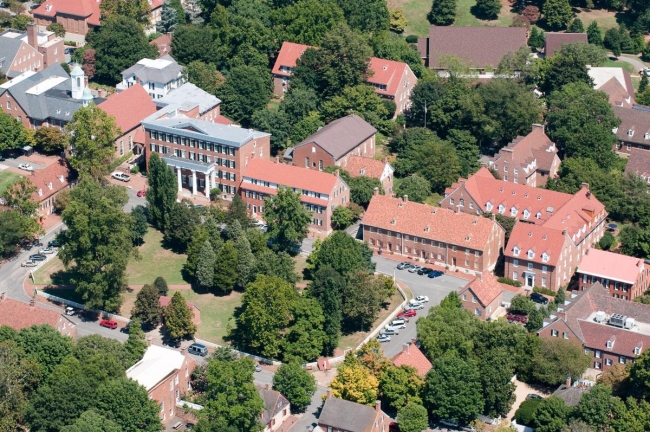You have /5 articles left.
Sign up for a free account or log in.

Salem College announced a new academic model and undergraduate experience Wednesday.
Courtesy of Salem College
A handful of colleges have debuted health-related programs during the pandemic, and Salem College just joined their ranks.
The small women’s liberal arts college in Winston-Salem, N.C., announced Wednesday that it will begin to offer three new health-related majors -- health sciences, health humanities and health advocacy and humanitarian systems -- beginning next fall. The college will also unveil a curriculum revamp that centers on leadership and health.
Despite what the announcement’s timing would suggest, Salem’s curricular changes were in the works long before the pandemic roiled colleges last spring. Susan Henking, interim president, said that the college's board and the campus worked together to develop the new curriculum.
Several years ago, the college's Board of Trustees sought to differentiate Salem from other liberal arts institutions. Choosing a focus area helped the college “resist the homogenization of American higher education,” Henking said.
It’s critical for liberal arts institutions to differentiate themselves and show students why the education they offer is relevant, said Rick Hesel, principal at Art & Science Group, a higher education consulting firm.
“If they don’t, I think their survival in the long term is in question,” Hesel said. “We’ve done a number of studies on the liberal arts, and just the mere words give institutions a disadvantage, we found.”
Salem is not the first liberal arts institution to try to break away from the pack. Agnes Scott College in Decatur, Ga., has its students focusing on leadership and global dynamics through a signature experience program called SUMMIT. Mills College in Oakland, Calif., also created a signature experience program several years ago.
Health is a particularly good focus area, Hesel said. Many colleges are currently looking to expand their health care and health-related programs. Saint Joseph’s University in Philadelphia recently announced a plan to acquire the University of the Sciences and along with it a slate of health sciences programs. A few years ago, Wheeling University in West Virginia gutted its liberal arts programs but left its health-care programs intact.
“The handwriting is on the wall,” Hesel said. “We have an aging population. There’s a genomics revolution going on that provides encouraging promise for health care, so a lot of places are moving in this direction.”
But many colleges are only looking to add health-care programs, and Salem is distinct in choosing to incorporate health into all its offerings, Hesel added.
Before it settled on health leadership, the board examined county-level data that answered questions about what career paths most interested high schoolers. It found that many potential college students were looking at health care. The new focus area fits the skill sets of current Salem students, too -- nearly 90 percent of Salem students who graduate with a degree from the natural sciences or mathematics departments are accepted into health-related programs, according to the college.
The board created a set of parameters for the curricular changes and then handed the reins over to the faculty.
“The board has established a set of guiding expectations in terms of an overall trajectory for health leadership,” said Daniel Prosterman, vice president for academic and student affairs and dean at Salem. “In terms of the development of the majors, the decisions with regard to the curriculum and the co-curriculum, that was then completed by a campus-designed team that’s composed of faculty leaders as well as a variety of members of staff from different sectors of the college.”
Faculty members and college boards are notorious for clashing over curricular and programmatic changes, but that hasn’t been the case at Salem, Henking and Prosterman said.
“Faculty governance adjusted itself to be able to act more quickly -- without being asked to do so -- and has really taken a leadership role in a way that I think challenges that narrative that boards are fast and presidents are fast and faculty are slow,” Henking said.
The new majors will not require any additional funding at this time, and the college doesn’t plan to hire any new faculty or staff members to support the changes. Instead, Henking described funding for the new programs as a redeployment of resources. The college hopes to build on the new programs in the future and may end up adding a few more employees. It will not cut any programs or employees in order to make room for the new majors.
“We wish to build a lot more things over time that will require fundraising, and we are in the process of moving that forward in a fairly aggressive way,” Henking said.
The new focus will hopefully attract new students as well as external partnerships, said Lucy Rose, a former Food and Drug Administration executive and global health-care consultant who is vice chair of Salem's board.
“We expect this transformation to attract more students, partnerships and funding,” Rose wrote in an email. “We’re excited that our plan, which will be implemented in phases, will offer us an opportunity to work with new partners and organizations that share in our values and will have a direct benefit in developing a new pipeline of women leaders in health.”
Salem College's undergraduate enrollment has dropped in recent years. During the 2018-19 academic year, Salem enrolled only 677 full-time undergraduate students, compared with nearly 1,000 during the 2015-16 academic year. The college also enrolls some graduate students and adult learners who are older than 23.




